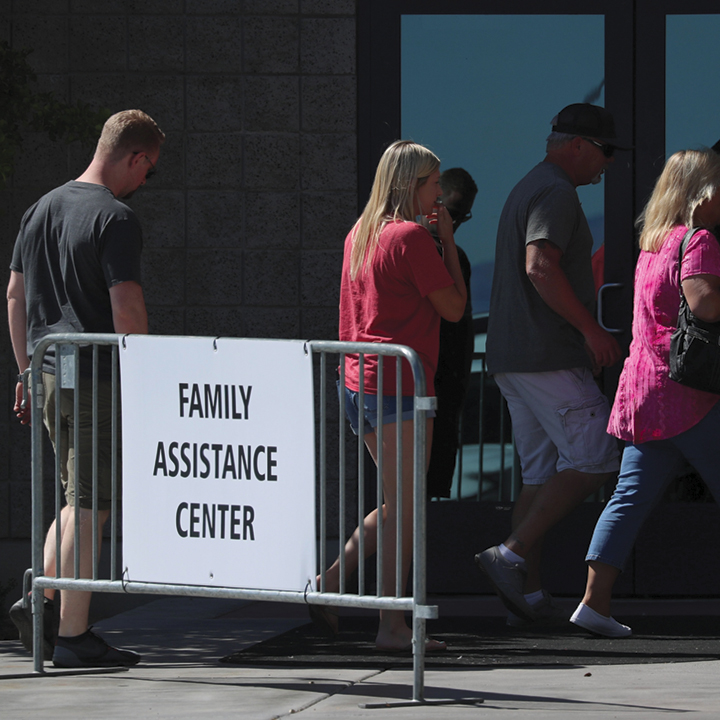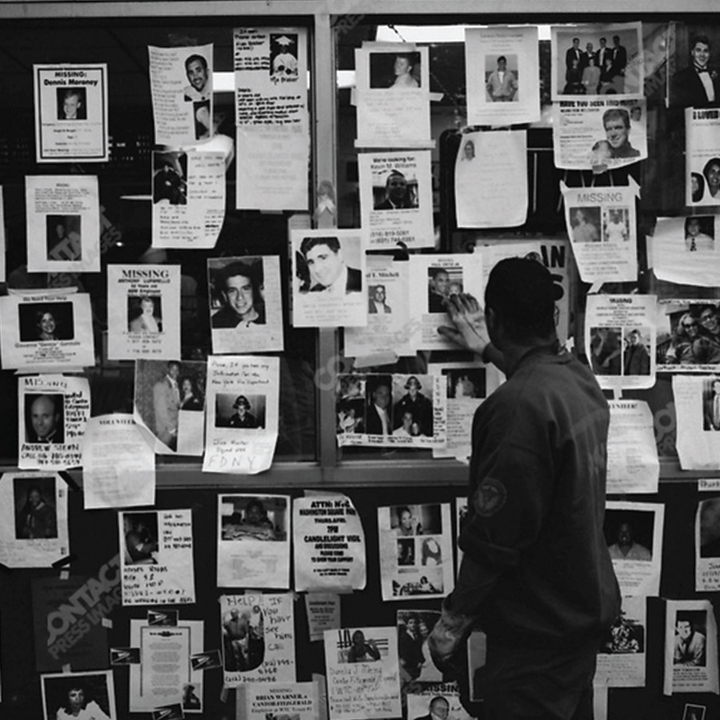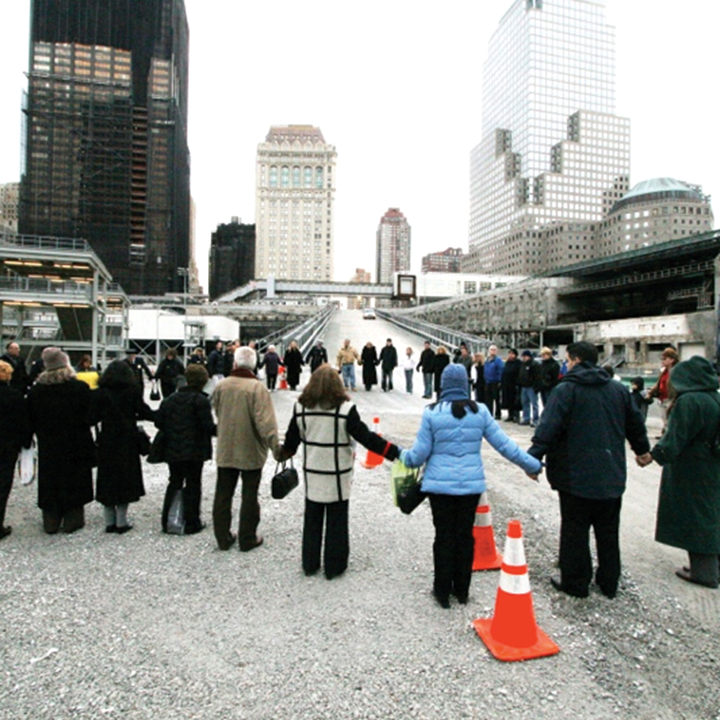Mass Violence Tip Sheets | Family Members

Voices Center for Resilience Mass Violence Tip Sheets
Tips for Family Members
of Victims of Mass Violence
Family members who have lost a loved one as a result of mass violence, or who is missing during or after a mass violence event, will need guidance for what to do next and how to cope in the days ahead. This document provides recommendations based on what VOICES has learned from working with thousands of victims’ family members since 2001
If a Loved One Is Missing
If a family member, friend, or colleague is missing, the first priority is to find out the status of your loved one. It is critical to find a trusted source for accurate information.
- Notify your family and friends.
- Contact the organization they are affiliated with, for example, the company, organization, airline, etc.
- Report your loved one missing to local authorities and federal agencies.
- Use social media channels to report.
- Provide your contact information to all of the above.
Find Resources at the Family Assistance Center
In the immediate aftermath, a Family Assistance Center or Reunification Center will provide a safe place and central location for victims’ families and survivors with streamlined access to timely information and organizations who are providing resources and services.
The Family Assistance Center helps with:
- Regularly scheduled briefings by official authorities
- Filing a missing person report
- Filing for a death certificate
- Providing DNA samples and information for victim identification
- Mental Health Counseling
- Health care and childcare
- Financial and legal support
- Referrals to other resources
- Victim assistance organization services
If You Live Outside the Area
Make contact with the organization that can provide information and assistance in travel and access to resources, such as the airline, corporation, agency, or government official who has jurisdiction over providing assistance.
If you are outside the country, contact international organizations such as embassies, the Federal Bureau of Investigation, or local or international Victim Service Agencies.

Voices Center for Resilience Mass Violence Tip Sheets
In the Immediate Aftermath
- Establish the whereabouts of your other family members and notify them about the situation.
- Identify an ongoing resource for accurate information.
- Identify trusted family and friends to serve as your intermediary and attend to your basic needs.
- Document important information, such as incoming phone calls, processes, and procedures.
- Talk to a counselor, clergy member, friend or family member that you can depend on for support.
- Limit overexposure to the media, including social media and television reports.
- Seek the help of a reputable attorney if you need legal advice.
- Seek a financial advisor to provide professional financial advice.
If Your Loved One Is Missing or Presumed Deceased
- File a missing person report.
- Provide photographs, identifying information, and details about what the person was wearing.
- Immediate relatives should provide a DNA sample and personal items such as a toothbrush, hairbrush, or dental records.

Voices Center for Resilience Mass Violence Tip Sheets
Seek Help and Support
Everyone grieves differently and in their own time, even individuals from the same family. Be patient with yourself and your family members. Take small steps toward healing by seeking support that can help you feel better over time.
- Acknowledge and accept both positive and negative feelings.
- Allow plenty of time to experience thoughts and feelings.
- Confide in a trusted person about the loss.
- Express feelings openly or write journal entries about them.
- Participate in bereavement groups or peer-to-peer support groups with individuals who have experienced a similar loss.
- Seek professional help if feelings are overwhelming.
Find Resources at the Family Assistance Center
Some things can impede or slow down the healing process following a death or loss, including:
- Avoiding emotions
- Compulsive behaviors
- Minimizing feelings
- Overworking on the job
- Misusing drugs, alcohol, or other substances as a way to deal with emotional discomfort

Voices Center for Resilience Mass Violence Tip Sheets
What to Expect After a Sudden Death
After suffering the sudden loss of a loved one, you may have strong emotional and physical responses because of the traumatic nature of the death. During the first four to six weeks following a sudden death you may experience strong emotional and physical responses.
Common Emotional Reactions
- Overwhelming shock manifesting itself as numbness, regrets, anger, despair, disbelief, guilt, anxiety, sometimes even relief
- Screaming or shaking
- Inability to talk or move
- Denial (this is not happening)
- Guilt for being alive, or self-blame
- Yearning to see the person again
- Restlessness, loss of concentration, loss of confidence, loss of interest in life
- Insomnia and nightmares
- Intrusive thoughts
- Inability to eat
- Anxiety and panic attacks
- Extended periods of crying and sobbing
- Irrational thoughts and actions
- Being terrified of being left alone, or not wanting others around at all
- Feeling that no one understands
Common Physical Reactions
- Fatigue
- Exhaustion
- General pains such as stomach ache or headache
- Nausea
- Lowered immunity
- Weight loss or weight gain
- Insomnia
- Diarrhea
- Stuttering
- Heart palpitations
- Jumpiness
When to Seek Professional Help
Emotional responses to the sudden loss of a loved one are common in the weeks after the loss. Seek professional help if symptoms continue for a prolonged period of time—months and years after the death.
Other reasons to seek professional help include drug abuse or increased use of tobacco or alcohol, suffering several losses, gaining or losing a significant amount of weight, experiencing uncontrollable anxiety, and failing to feel somewhat better after a year has passed.

Voices Center for Resilience Mass Violence Tip Sheets
Planning a Memorial Service or Funeral
- Consider whether you need financial assistance. Victim Assistance programs often provide assistance with funeral expenses. Financial support may also be available from sources such as a church, a union, or a fraternal organization that the deceased belonged to.
- Enlist relatives and friends to help. Help may be needed with the funeral to serve as pallbearers, to create or design the funeral program, cook meals, take care of children or pets, or shop for items needed for the funeral or household of the deceased.
- Select a headstone or urn. Headstones and urns can often be purchased through the cemetery, funeral home, or from an outside vendor. Consult the cemetery about headstone rules, regulations, and specifications such as color and size.
- Organize a post-funeral gathering. Depending on your tradition, a wake can be held before the funeral or memorial service. Enlist the help of friends and relatives.
- Prepare an obituary. You may want to write the obituary yourself, or ask family and friends or the funeral home for assistance. Include information about the time, date, and address to send flowers, or identify a foundation for donations made in lieu of flowers.
- Inform your relatives and friends. Once a date and time has been set for the service, share the details with those on your contact list.
- Keep a list of well-wishers. Keep a record of those who send cards, flowers, and donations so you can send an acknowledgment later.
VOICES Support - Phone: 203-966-3911; Email: support [at] voicescenter.org (Support[at]VoicesCenter[dot]org)
VOICES Mission - From 9/11 to today, Voices Center for Resilience assists communities in preparing for and recovering from tragedy, and provides long-term support and resources that promote mental health care and wellness, for victims’ families, responders and survivors.
